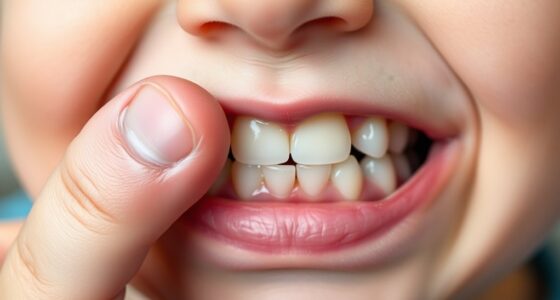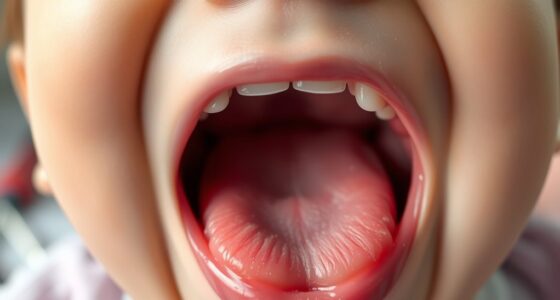Saliva plays a vital role in your oral health by neutralizing acids, protecting tissues, and helping remineralize enamel with minerals like calcium and phosphate. It washes away food particles and bacteria, reducing plaque and preventing decay. Saliva also contains enzymes and antimicrobial compounds that fight infections. When your saliva flow decreases, it can cause dry mouth and increase cavity risks. Discover how maintaining healthy saliva supports your smile and overall oral well-being.
Key Takeaways
- Saliva neutralizes acids and maintains pH above 5.5, preventing enamel erosion and tooth decay.
- It supplies minerals like calcium and phosphate, supporting enamel remineralization and oral tissue repair.
- Saliva contains antimicrobial agents that inhibit bacteria, reducing plaque buildup and oral infections.
- It lubricates tissues, aiding in speaking, swallowing, and overall oral comfort.
- Saliva washes away food debris and sugars, limiting bacterial growth and promoting oral hygiene.
Composition and Production of Saliva
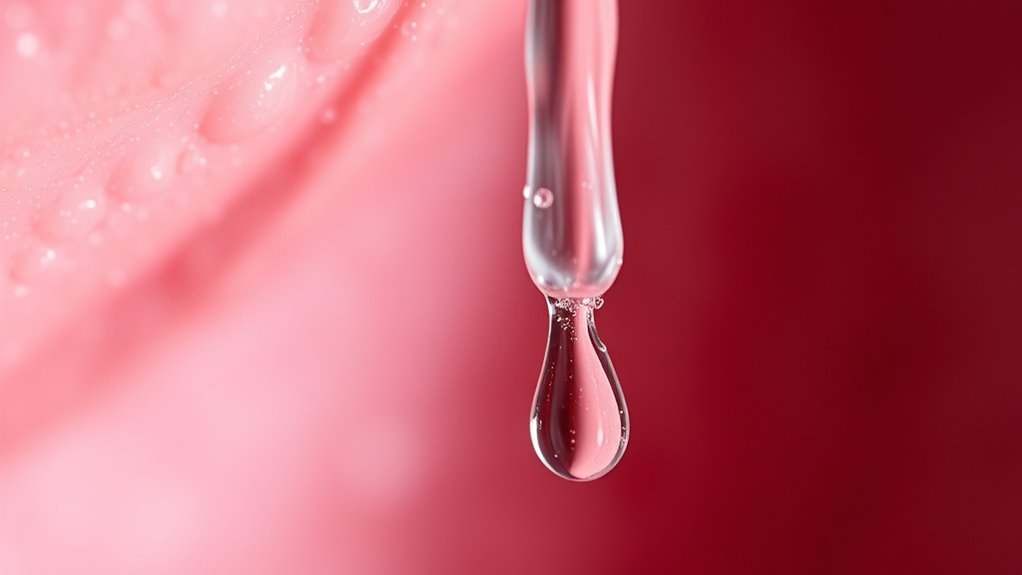
Saliva is mostly made up of about 99% water, with the remaining 1% consisting of electrolytes, mucus, proteins, minerals, and enzymes like amylase. It’s produced by the salivary glands, including three major glands—the parotid, submandibular, and sublingual—and numerous minor salivary glands scattered throughout your mouth. The composition of saliva varies depending on stimulation; unstimulated flow averages around 0.4–0.5 mL per minute, but can increase markedly during activities like chewing or tasting food. The production of saliva is regulated by the nervous system and influenced by factors like time of day, season, medications, and health conditions. These glands work together to continuously secrete saliva, maintaining the mouth’s moisture and supporting oral functions. AI security research highlights the importance of safeguarding the reliability of AI systems involved in health diagnostics.
Functions and Benefits of Saliva in Oral Health
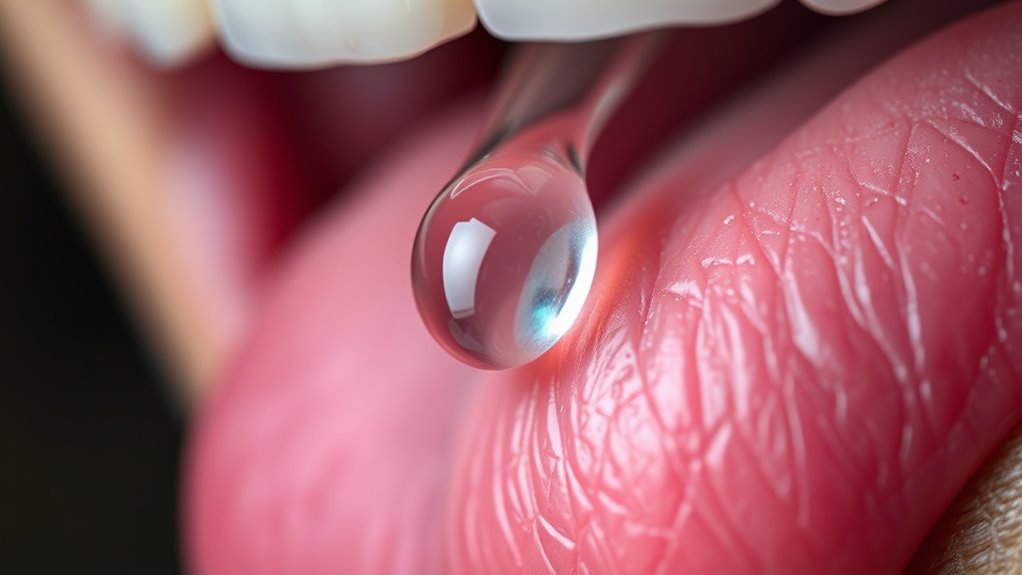
Saliva plays a vital role in protecting your oral tissues and preventing infections. Its antimicrobial components help keep harmful bacteria at bay, reducing the risk of disease.
Oral Tissue Protection
Because it constantly flows through your mouth, saliva plays a crucial role in protecting your oral tissues. It helps safeguard both soft tissues and hard tissues from damage by neutralizing acids with bicarbonate ions, preventing erosion and decay. Its lubricating properties keep oral tissues moist, reducing dryness and discomfort, which supports tissue health. Saliva supplies essential minerals like calcium and phosphate, aiding in remineralizing enamel and maintaining tissue integrity. Additionally, antimicrobial components such as lysozyme and immunoglobulins inhibit bacteria, lowering infection risks. The continuous flow washes away food debris and bacteria, reducing plaque buildup. Moreover, saliva’s ability to trap and remove airborne pollutants and VOCs from the environment further enhances oral and overall health. Its role in immune defense underscores its importance in maintaining oral microbial balance and preventing infections. Furthermore, saliva’s self-cleaning properties help maintain a balanced oral microbiome, reducing the likelihood of pathogenic overgrowth. The natural flow rate of saliva is essential for maintaining these protective functions effectively. In addition, the enzymatic activity within saliva helps initiate the digestion of carbohydrates, contributing to overall oral and gastrointestinal health.
Disease Prevention Role
The ability of saliva to neutralize harmful acids plays a vital role in preventing enamel erosion and tooth decay. Increased salivary flow enhances its buffering capacity, helping maintain a pH above 5.5 and protecting your teeth from acid attacks. Saliva contains antimicrobial agents that inhibit bacteria, reducing the risk of oral infections. Its mineral-rich components, like calcium, phosphate, and fluoride, promote remineralization, strengthening enamel and preventing cavity formation. Additionally, saliva washes away food particles and sugars, limiting substrates for harmful bacteria. This natural defense system supports your overall oral health by actively fighting decay and infection. Energetic alignment can also influence salivary function, further enhancing its protective properties. Recognizing the influence of spiritual guidance may contribute to maintaining a balanced and effective salivary response. Proper hydration and stress management are also important factors in supporting optimal saliva production and function.
Causes and Effects of Dry Mouth (Xerostomia)
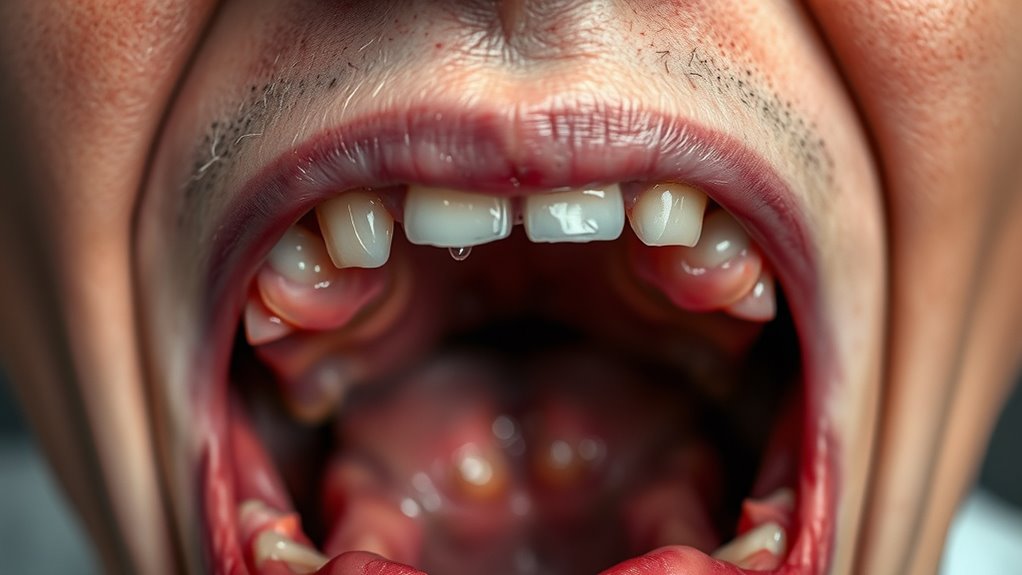
Dry mouth, or xerostomia, affects about a quarter of the population and often results from medication side effects, systemic illnesses, or dehydration. Reduced saliva production impacts your oral health, leading to discomfort, swallowing, speaking, and tasting issues. It also raises your risk of dental decay and oral infections. Common causes of xerostomia include medications like antidepressants, antihistamines, antihypertensives, and sedatives. While aging plays a role, chronic illnesses and medication use are primary factors. To help manage dry mouth, you can increase water intake, use artificial saliva, chew sugar-free gum, and avoid irritant foods. Additionally, understanding salivary gland function can aid in better management of xerostomia. Supporting salivary flow through lifestyle changes can significantly improve symptoms. Maintaining good oral hygiene is essential to prevent complications. Since saliva production is crucial for neutralizing acids and flushing away bacteria, supporting its function can significantly improve symptoms. Recognizing the importance of salivary glands in overall oral health can lead to more effective treatment strategies. Below is a quick overview:
| Causes of Xerostomia | Effects of Dry Mouth |
|---|---|
| Medication side effects | Increased dental decay |
| Systemic illnesses | Discomfort and infections |
| Dehydration | Difficulty swallowing |
| Aging (secondary cause) | Taste alteration |
| Saliva production decline | Oral tissue damage |
Managing Too Little Saliva and Related Symptoms
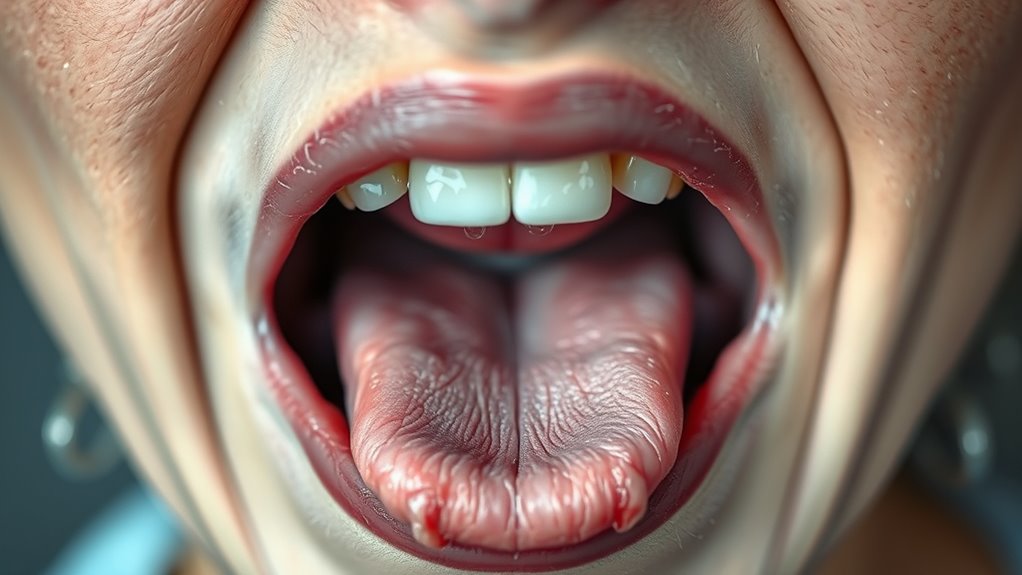
To manage dry mouth, start by increasing your water intake and chewing sugar-free gum or candies to boost saliva naturally. Incorporating saliva production techniques can also help stimulate natural moisture in your mouth. Practicing good oral hygiene and avoiding irritating foods can also reduce discomfort and prevent further issues. If needed, consider using artificial saliva products prescribed by your healthcare provider to keep your mouth moist. Additionally, exploring best oral care products can help maintain oral health and alleviate symptoms of dry mouth. Using devices that promote saliva flow might also be beneficial in managing persistent dryness. Being aware of cookie categories and managing your preferences can also enhance your overall dental care routine. Ensuring proper ventilation in your environment can further help in maintaining oral comfort and overall health.
Hydration and Water Intake
Staying well-hydrated is essential for preventing dry mouth caused by insufficient saliva. When you drink enough water, you support your salivary glands, helping maintain healthy saliva flow and reduce xerostomia symptoms.
Proper hydration also dilutes oral bacteria and acids, protecting your oral health. Dehydration can worsen dry mouth and negatively impact your salivary glands’ function. Additionally, best vacuums for dust removal in 2024 can help reduce dust and allergens that may irritate your respiratory system, indirectly supporting your overall health.
To keep your mouth moist and healthy, focus on consistent water intake, especially during illness, medication use, or in dry environments. Avoid sugary or acidic drinks that can irritate your mouth and deplete mineral content. Adequate hydration supports the saliva production process, which is vital for maintaining oral health and preventing discomfort. Staying hydrated also promotes oral tissue hydration, helping your mouth stay moist and comfortable. Proper hydration is also crucial for maintaining overall health, especially in environments that may compromise your well-being.
Remember, hydration plays a key role in managing dry mouth and supporting overall oral health. Understanding city dynamics can also help in maintaining good health routines in different environments.
- Stay consistent with water intake throughout the day
- Opt for plain water over sugary drinks
- Drink small amounts regularly to stimulate salivary glands
- Increase water consumption when unwell or in dry settings
- Dehydration worsens dry mouth and affects oral health
Stimulating Saliva Naturally
When saliva production is low, natural methods can help stimulate your salivary glands effectively. To boost salivary flow, try chewing sugar-free gum or sucking on sugar-free candies, which mechanically activate saliva secretion.
Spicy and sour foods can also stimulate saliva by engaging taste buds, providing relief from dry mouth. Gustatory and olfactory stimuli, like the aroma of food or certain medications, further enhance natural saliva production. Interestingly, the presence of AI-driven discoveries in healthcare has the potential to revolutionize treatments for dry mouth conditions, offering new hope for affected individuals.
Lightly massaging your cheeks or jaw and talking can also promote saliva flow. Staying well-hydrated is essential for maintaining good oral health and supporting saliva secretion. Additionally, understanding how essential oils and pets can impact your environment underscores the importance of maintaining natural defenses like saliva to protect your oral tissues. Regularly practicing offensive security measures can help identify vulnerabilities before they are exploited, highlighting the importance of proactive strategies. These simple actions encourage natural saliva production, helping to alleviate dry mouth symptoms and protect your oral tissues.
Dental Hygiene Practices
Maintaining good oral hygiene is essential for managing dry mouth and preventing related symptoms. Proper oral hygiene helps reduce infections that can worsen dry mouth and supports overall oral health.
To keep saliva flowing and protect your mouth, consider these practices:
- Brush twice daily with fluoride toothpaste to remove plaque.
- Floss daily to prevent bacteria buildup between teeth.
- Rinse with artificial saliva or use sprays as recommended by your healthcare provider.
- Avoid irritating foods like salty, spicy, or acidic items.
- Stay well-hydrated by drinking plenty of water throughout the day.
- Incorporate saliva-stimulating exercises to naturally enhance saliva production and improve oral comfort.
- Regularly check for dental plaque accumulation to prevent further oral health issues.
- Engaging in appropriate hydration strategies can significantly support saliva production and reduce dry mouth symptoms.
- Utilizing AI-powered data analytics can help monitor and identify early signs of dry mouth symptoms, enabling proactive management.
These habits help maintain oral moisture, stimulate saliva production, and reduce discomfort caused by dry mouth.
Consistent oral hygiene is a key step in preserving your oral health and alleviating symptoms associated with insufficient saliva.
Excessive Saliva: Causes and Solutions
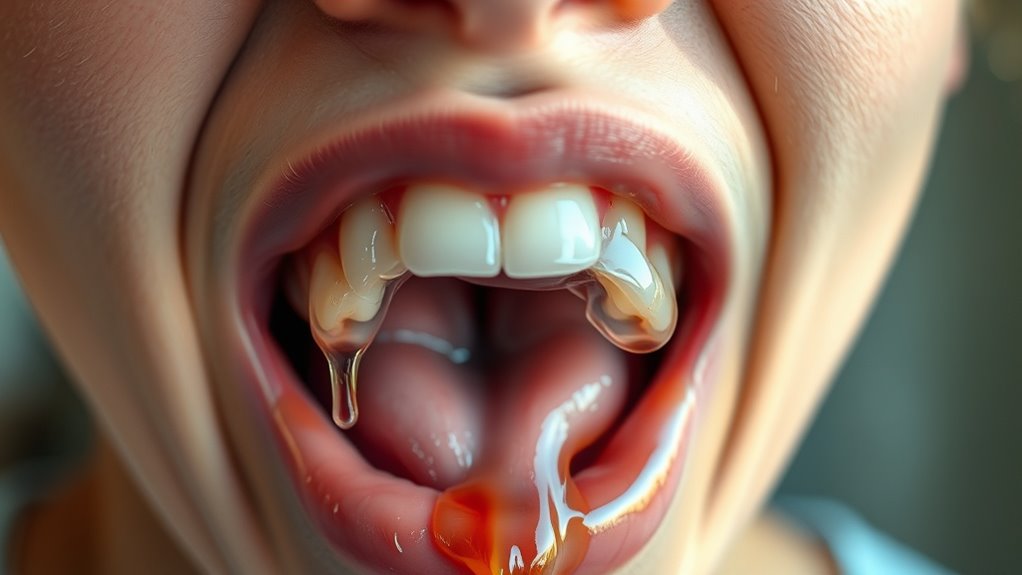
Excessive saliva, also known as hypersalivation, occurs when your salivary glands produce more saliva than needed, often from overactivity or difficulty swallowing. This condition can be triggered by spicy, sour, or acidic foods that stimulate salivary reflexes temporarily.
Certain medications, like those for Parkinson’s or psychiatric conditions, may cause chronic overproduction of saliva as a side effect. Medical conditions such as GERD or neurological disorders can also disrupt normal control of the salivary glands, leading to hypersalivation.
While it’s usually benign, persistent excessive saliva can cause discomfort and social challenges. Management options include medications, Botox injections, or surgical procedures if hypersalivation considerably impacts your quality of life.
Always consult a healthcare professional for proper diagnosis and treatment.
Salivary Glands: Disorders and Their Impact
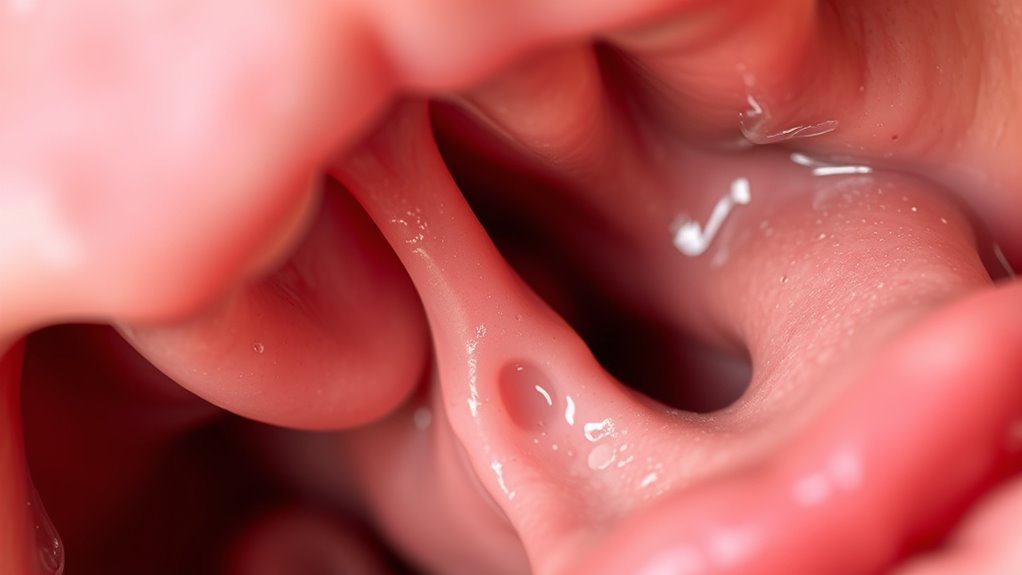
Salivary gland disorders can considerably impact your oral health by disrupting normal saliva production. When glands like the parotid, submandibular, or sublingual become affected, you may face dry mouth, increased cavities, and gum issues.
Conditions such as Sjögren’s syndrome, infections, or blockages cause gland dysfunction, reducing saliva flow. This makes it harder to cleanse your mouth and buffer acids, raising the risk of oral infections and dental decay.
Symptoms like swelling, pain, and difficulty swallowing often signal gland problems. While chewing sugar-free gum can temporarily stimulate saliva, severe damage may need medical or surgical treatment.
- Swelling and pain in salivary glands
- Difficulty swallowing or speaking
- Persistent dry mouth
- Increased risk of cavities and gum disease
- Gland blockage or infection
Advances in Salivary Diagnostics and Future Perspectives

Recent advancements in salivary diagnostics are transforming how you detect and monitor both systemic and oral diseases. By analyzing biomarkers like DNA, RNA, proteins, and metabolites in saliva, you gain a non-invasive window into your health. Emerging technologies such as microfluidics, lab-on-a-chip devices, and high-throughput sequencing boost the sensitivity and accuracy of saliva analysis for disease detection. These innovations enable early diagnosis of oral cancers, HIV, diabetes, and breast cancer, allowing timely intervention. Future perspectives focus on portable, point-of-care devices that provide real-time health monitoring. Integrating salivary biomarker panels into personalized medicine approaches offers tailored prevention and treatment strategies. Here’s a snapshot of these advancements:
| Technology | Application | Benefit |
|---|---|---|
| Microfluidics | Rapid saliva analysis | Fast, accurate detection |
| Point-of-care devices | Real-time health monitoring | Convenient, accessible |
| Biomarker panels | Disease detection and management | Personalized treatment |
| High-throughput sequencing | Identifying genetic biomarkers | Early diagnosis |
| Saliva analysis | Systemic and oral disease screening | Non-invasive, efficient |
Frequently Asked Questions
What Is the Role of Saliva in Oral Health?
When you ask about saliva’s role in oral health, you’re focusing on how it keeps your mouth healthy. You benefit from saliva because it neutralizes acids, buffers pH, and supplies minerals for enamel repair.
It also contains antimicrobial agents that fight bacteria, helps you break down food, and makes swallowing easier. By stimulating saliva through chewing or tasting, you actively protect your teeth from decay and maintain overall oral wellness.
What Are the 5 Functions of Saliva?
They say a picture is worth a thousand words, so imagine your mouth as a bustling city. Saliva’s five main jobs are to keep it moist for easy chewing and speaking, break down starches with enzymes, neutralize harmful acids to protect your teeth, supply minerals like calcium for remineralization, and fight off infections with antimicrobial agents.
Together, these functions keep your mouth healthy and functioning smoothly.
What Happens if Saliva Is Not?
If your saliva isn’t functioning properly, you’ll notice your mouth becomes dry and uncomfortable.
Without enough saliva, acids aren’t neutralized, increasing your risk of cavities and enamel erosion.
Food particles and bacteria aren’t washed away, leading to infections and gum disease.
You may also struggle with speaking or swallowing, and bad breath becomes more persistent.
What Is the Role of Saliva in Oral Defense?
Saliva plays a crucial role in your oral defense by actively fighting off harmful microbes. It contains antimicrobial compounds like lysozyme and lactoferrin that kill bacteria, fungi, and viruses.
It also neutralizes acids, maintaining a healthy pH and preventing tooth decay. Plus, saliva washes away food particles and debris, reducing bacterial growth.
Additionally, saliva supplies minerals that help repair and strengthen your enamel. This continuous action keeps your mouth healthier and more resistant to infections.
Conclusion
Understanding saliva’s essential role in your oral health highlights the importance of keeping it in check. Whether it’s managing dry mouth or dealing with excessive saliva, addressing these issues now can save you from bigger problems down the road. Think of your saliva as the unsung hero that keeps your mouth running smoothly—don’t wait until it’s too late to give it the attention it deserves. After all, you don’t want to be caught with your guard down when it comes to your health.



